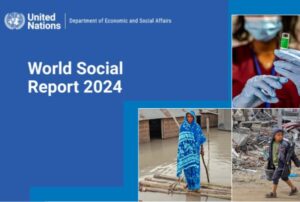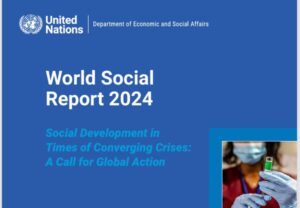The Impact of Global Crises on Poverty: Insights from the World Social Report 2024

The World Social Report 2024 highlights the profound impact of recurrent global crises, such as climate change, economic instability, and the COVID-19 pandemic, on poverty levels worldwide.
These crises have reversed decades of progress in poverty reduction and exacerbated existing inequalities. According to the report, extreme poverty has increased significantly in the past few years, with global food insecurity and economic hardships driving millions into chronic poverty.
The Poverty Trap
A key issue discussed in the report is the concept of the poverty trap—a self-reinforcing mechanism where crises push individuals or households into poverty, from which they cannot easily escape. For example, loss of income during a crisis often leads to lower access to education, healthcare, and nutrition, thus reducing future earning potential. The report emphasizes that once households fall into poverty, they struggle to recover without external interventions such as social protection programs.
For instance, during the COVID-19 pandemic, the world saw a reversal in the decline of global extreme poverty, which increased for the first time in two decades. The report estimates that over 122 million more people faced hunger by 2022 due to the pandemic’s cascading effects, compounded by other crises like rising inflation and climate change.
Climate Change as a Crisis Multiplier
The report stresses that climate change plays a critical role in exacerbating poverty. Extreme weather events such as droughts, floods, and hurricanes disrupt food production, displace populations, and damage critical infrastructure. These effects disproportionately impact low-income countries, particularly those reliant on agriculture and natural resources. For instance, climate-induced disasters have pushed millions of people into poverty by destroying their livelihoods and homes.
As these climate-related crises become more frequent, their economic and social impacts worsen. The report highlights that the costs of inaction are severe—ranging from food insecurity to displacement and loss of livelihoods, all of which further entrench poverty.
Gendered Impacts of Crises
The World Social Report 2024 also highlights the disproportionate impact of crises on women and girls, especially in developing countries. Crises widen the existing gender gaps in employment, healthcare, and education. During global crises like the COVID-19 pandemic, women were more likely to lose their jobs and face higher barriers to reemployment. This has led to growing gender inequality, particularly in labor markets, where women are more vulnerable to economic shocks.
Social Protection Systems and Global Responses
One of the most critical solutions proposed by the report is strengthening social protection systems. Social protection plays a vital role in mitigating the impacts of global crises on poverty. However, the report reveals that more than 4 billion people globally lack access to any form of social safety net, leaving them highly vulnerable to shocks.
For low-income countries, achieving universal social protection by 2030 is estimated to cost about $1.4 trillion. Expanding these systems could provide a buffer against poverty during crises, allowing vulnerable populations to recover more quickly. The report calls for greater international cooperation to support countries in building these protection systems.
Economic Inequality and Fiscal Challenges
The report emphasizes the role of inequality in shaping the impact of global crises on poverty. Both within and between countries, inequality has risen significantly. Low-income households, particularly in developing countries, have been disproportionately affected by economic instability, inflation, and unemployment. As a result, they have experienced greater income losses and more prolonged recovery periods compared to wealthier populations.
At the same time, fiscal challenges, such as rising debt levels, have constrained the ability of many governments to invest in poverty reduction programs. The report calls for international collaboration to help heavily indebted countries create fiscal space for social development.
Conclusion
The World Social Report 2024 presents a stark reality: global crises are deepening poverty and inequality, undoing years of progress in social development. The interconnected nature of these crises means that their impacts are felt across borders, sectors, and communities. Addressing the root causes of poverty and inequality will require coordinated global action, investment in social protection, and targeted policies to build resilience against future shocks. Without immediate action, the world risks falling further behind in its goal of eradicating poverty by 2030.





